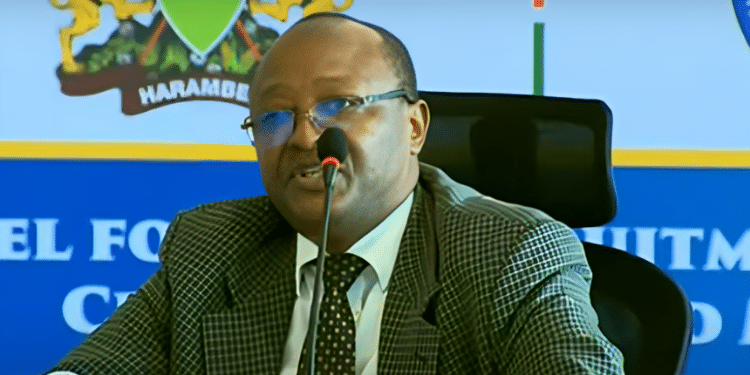IEBC Commissioner candidate questions President’s role in appointments

A candidate vying for a position as a commissioner in the Independent Electoral and Boundaries Commission (IEBC) has raised concerns about the President’s role in the appointment process, questioning the fairness and neutrality of the selection.
Eliud Wanjao expressed doubt about whether the President would remain impartial in appointing members of the electoral body from the list that the selection panel will present.
He pointed out that the President is not legally obligated to disclose the criteria used in selecting the final candidates.
“At the end of the exercise, you [the selection panel] will be submitting two names for chairman and nine names for member. Do you think under the principles of neutrality, that is a fair thing in terms of what the law says or it should be amended?” Wanjau posed during his interview.
He emphasized that the current framework allows the President to select and drop candidates without being required to explain the reasons behind his choices.
“This is a situation whereby the President will pick XYZ and drop XYZ and is under no obligation under the law to make an explanation of why he dropped X and picked Y.”
Responding to Wanjau’s concerns, selection panel chairman Nelson Makanda stated that the team was operating within the confines of the law.
However, he declined to comment on whether the process guarantees fairness in the appointment of commissioners.
“I may not be able to speak to the fairness of it – whether it is or not – but the laws in Kenya are made through the National Assembly and public participation,” Makanda explained.
“It is the laws that Kenyans have ventilated on, and so we follow the will of the people of Kenya.”
Wanjau, a former deputy commissioner at the Kenya Revenue Authority, also faced questions regarding a previous mix-up in his candidacy status.
He was pressed to clarify why the IEBC had listed him as an independent candidate for Kirinyaga County senator while he was actually a running mate for governor aspirant Wangui Ngirici in the 2022 elections.
He dismissed the error as an IEBC mistake, stating that he had taken steps to correct it with the agency.
“It was a mistake, and they removed it because at the end of the day, it was impossible [to be a candidate for both seats],” he explained.
Wanjau said he would push for a more thorough vetting of candidate registers before publication to prevent such errors in the future.
“If somebody intends to vie for a certain position and then withdraws [and] they don’t remove him from the roll, then I think it is wrong,” he said.
“I would ensure that the register of candidates is inspected and audited before it is published so that what goes to the government printer for gazettement is actually bona fide contestants.”
Addressing tensions within the IEBC, Wanjau suggested that the commission should not be associated with individuals but instead be recognized as an independent institution.
“I would actually attribute the stormy relations between the chairman and the commissioners to personality issues,” he noted.
He also dismissed claims that the IEBC’s server and portal are identical, arguing that an auditable election system is essential to ensure transparency.
“The server is the back-end infrastructure of the system. If you have fake polling stations, you can interfere with what the server is transmitting to the portal,” he said.
Meanwhile, another candidate, Erastus Edung, elaborated on how the IEBC should handle electoral boundary reviews.
He highlighted the need to consider population size, geographical features, and community interests in the process.
“Those are the parameters that have been specified in the Constitution,” Edung stated.
Before altering electoral boundaries, Edung stressed the importance of public hearings in affected areas and timely submission of reports to Parliament.
He noted that the IEBC must also prepare for legal challenges and allocate time for courts to resolve disputes as stipulated in the law.
The selection panel continues its interviews as it works toward filling vacant IEBC positions, a critical process that will shape the future of Kenya’s electoral landscape.
